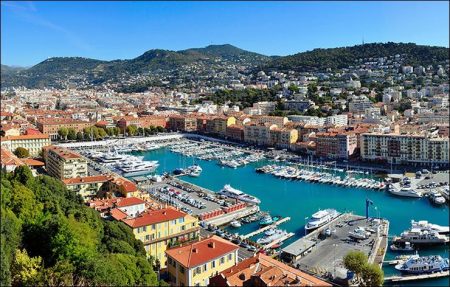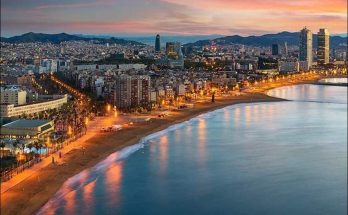There’s more, however, to Nice and vicinity than sunning and swimming. Hope has contributed the following report on the culture of the Côte d’Azur:
“Rainy days on the Riviera can be richly rewarding if you spend them visiting same of the fast-growing number of museums that dot the area. In addition to the spots already mentioned by Arthur, there is, for example, the exciting, new Marguerite et Aime Maeght Museum, built by the well-known gallery owner and art lover on his estate in Saint-Paul-de-Vence, which is near both Vallauris and the Matisse Chapel. The Maeght Museum is so new that it wasn’t even open on our last visit to Nice in late summer of 1964, but it’s a must-see, if only because its design is the most revolutionary advance in museum construction since the opening of the Guggenhe in Museum in New York.
“Then there’s the Musee Fernand Leger, located in the small town of Biot (near Antibes), which is open every day except Monday. It will delight the fans of this artist, who specializes in large, 20th Century, machine-like paintings. And you can’t miss the museum, because there’s a huge Leger mural covering the entire front of the building.
“Next, way up in the hills of Nice, you’ll find the Villa des Arenes, which houses both the Matisse Museum and the Museum of Archaeology. The first, of course, houses an extraordinary collection of Matisse’s paintings, drawings, studies, models-and same of those famous “cutouts”, It’s a deep sensory pleasure to view this artist’s work in the setting in which he actually lived and painted because, as you enter the museum still tingling with the unique Riviera atmosphere in your mind’s eye, you’ll realize that you are seeing nature as he saw it-and suddenly you’ll appreciate why he chose to paint in the vivid colors of his most familiar works.
As a bonus, there’s a room here of Matisse’s furniture, which he made famous by painting so often-and it’s fun to recognize the actual items you’ve seen portrayed in his paintings. As for the Museum of Archaeology, it stands just next to the Roman ruins of Cimiez-an entire Roman city now in process of being uncovered; inside, the museum displays a small collection of Roman artifacts found on the digging site.
“For your final museum visit, try to get to the “Chateau Grimaldi”-the Musee d’Antibes-located on the ramparts of Antibes (the city west of Nice). This ancient, white-washed building, you’ll be thrilled to learn, was the home of Picasso for many years, and now houses a gigantic collection of the Master’s paintings that you have probably never seen before (not even in reproductions) and are not likely to see anywhere else but here. The entire museum is a celebration of Picasso-a rare experience I hope you won’t miss!”
Views: 167



